Editor’s note: This article is the opening statement given by Libertarian Institute managing editor Keith Knight in his Zerohedge debate with author James Holland on the merits of fighting the Second World War which took place on November 6, 2025. You can watch the full debate here.
To briefly summarize the anti-war position:
- The costs of warfare are extremely high.
- The high costs are often imposed on unwilling participants.
- The outcomes of warfare are highly uncertain.
- The primary decision makers -politicians- face little incentive to produce beneficial results since they often have access to the involuntary labor of conscripts and can fund their operations involuntarily through taxation.
With these general metrics in mind, I want to make the case that Britain and the United States should not have entered into the second world war.
Consider the war from the German point of view:
Their Eastern Enemy, the Bolshevik regime, kept engaging in acts of aggression.
In 1917, they staged a coup against Czar Nicholas II** and conquered Russia, leading to a four year civil war killing millions of people.
In 1918, the Bolsheviks assisted Rosa Luxemburg in the November Revolution attempting to annex Germany. In 1919, the Bolsheviks invaded Poland killing hundreds of thousands of people, and set up a puppet state in Hungary with Béla Kun.
In 1920, the Bolsheviks occupied Azerbaijan, the same year they occupied Armenia. In 1921, they invaded Georgia.
In 1932, they starved millions of Ukrainians to death in the Holodomor. In 1934, the Bolsheviks invaded Xinjiang, China. In 1935 Germans found themselves encircled by the Franco-Soviet Pact followed by the Czech-Soviet Treaty of Alliance. In 1939 the Bolsheviks invaded Finland, and Poland.
In 1940, the Bolshevik regime occupied and annexed Latvia, Estonia, Lithuania, Romania, Bessarabia (Today, Moldova), and Bukovina (today, Ukraine/Romania).
By 1941, the German National Socialists fought the Russian International Socialists under the guise of opposing the Bolshevik “international, worldwide conspiracy” as [Adolf] Hitler called it in his June 22, 1941 speech.
[Winston] Churchill understood the Soviet menace, saying in a 1920 article titled Zionism Versus Bolshevism, that Bolshevism is a “system of morals and philosophy, as malevolent as Christianity was benevolent…[and a]…world-wide conspiracy for the overthrow of civilisation and for the reconstitution of society on the basis of arrested development, of envious malevolence, and impossible equality.”
On Germany’s western border, they had the British Empire, which comprised nearly one-quarter of the world’s land surface and more than one quarter of the world’s population, yet it is Germany who is accused of wanting to “take over the world.”
In the case of Japan, the Chinese Communists had been fighting the Chinese Nationalists since 1927. America fought a war 6,000 miles away in Korea, and 8,000 miles away in Vietnam, under the guise of stopping the spread of communism, we can see why Japan, separated from China only by the East China Sea, saw a Chinese Communist victory as a potential security threat.
Just as you can’t rationally analyze a trial by only looking at the prosecution’s arguments—you must consider the defense—so too should we consider the point of view of the Axis powers.
This nuanced view at least takes us away from the thesis that the Germans were pure unprovoked evil-doers hell-bent on conquering the world thus could not be negotiated with and must be bombed into unconditional surrender.
Onto the case of the British Empire.
Prime Minister Neville Chamberlain and French President Albert Lebrun declared war on Germany September 3 of 1939, with the explicit reasoning that Germany violated Polish Independence on September 1 when Hitler invaded Poland seeking to reunite Danzig with Germany, a town that was 95% German and was part of the Kingdom of Prussia as far back as 1793.
Two weeks later on September 17, the Soviet Union invaded Poland, and no such declaration of war was issued against them by France or Britain. This implies that the original justification for the Allies entrance into world war two, was completely fraudulent, and simply an excuse to declare war against Britain’s biggest competitor on the continent.
By 1945, this war for Polish Independence had resulted in roughly five million dead Poles and all of Poland—not just Danzig—occupied by the Lublin-Soviet government.
In the preface of Churchill’s 1948 memoir titled The Gathering Storm, Churchill says:
“The human tragedy reaches its climax in the fact that after all the exertions and sacrifices of hundreds of millions of people and the victories of the Righteous Cause we have still not found Peace or Security, and that we lie in the grip of even worse perils than those we have surmounted.”
In Churchill’s memoir, Triumph and Tragedy he summarizes the post war state of Europe saying:
“[T]he territories under Russian control would include the Baltic provinces, all of Germany to the occupational line, all Czechoslovakia, a large part of Austria, the whole of Yugoslavia, Hungary, Rumania, [and] Bulgaria…”
This was not a state of affairs worth killing and conscripting millions of mostly innocent people over.
Consider the many atrocities committed by the British Empire during the war.
J. M. Spaight was the Principal Assistant Secretary at Air Ministry [and] in his 1944 book Bombing Vindicated he says:
“In May, 1940, Churchill sent the first bombers against the German civilian population…Retaliation was certain if we carried the war into Germany…Yet, because we were doubtful about the psychological effect of propagandist distortion of the truth that it was we who started the strategic offensive, we have shrunk from giving our great decision of May, 1940, the publicity which it deserved.”
The German Blitz didn’t begin until September 7, 1940. Does this sound like a country hellbent on war with the British? The British declare war against Germany over Danzig in September of 39 and Germany waits a year to begin bombing British cities.
On July 3, 1940 Churchill authorized Operation Catapult where he intentionally killed 1,297 French Servicemen claiming he feared the Germans would capture the ship off the coast of Algeria.
On February 14, 1942 Vice Air-Marshal Norman Bottomley memo’d Air Officer Marshal Baldwin writing:
“[I]t has been decided that the primary object of your operations should now be focussed on the morale of the enemy civil population and in particular, of the industrial workers.”
On March 30, 1942 Frederick Lindemann, head of the Statistical Branch appointed by Churchill wrote the “de-housing” memo saying:
“If even half the total load of 10,000 bombers were dropped on the built-up areas of these fifty-eight German towns, the great majority of their inhabitants (about one-third of the German population) would be turned out of house and home.”
On October 19, 1943 a report by the Ministry of Home Security reads:
“Table IV (4) summarizes the effects of damage to housing…People whose houses are uninhabitable…931,000…Other people whose houses have been damaged…1,150,000”
Marshal of the Royal Air Force Arthur Harris wrote a book Dispatch on War Operations saying:
“The aim of attacks on town areas had already been defined in an Air Staff Paper (dated 23rd September, 1941) as follows:- “The ultimate aim of the attack on a town area is to break the morale of the population which occupies it. To ensure this we must achieve two things ; first, we must make the town physically uninhabitable and, secondly, we must make the people conscious of constant personal danger.”
The dehousing and killing of civilians was official British policy.
When it comes to American involvement, this too was not only unjustifiable but the costs exceeded the benefits.
The attack on Hawaii—which was not a U.S. state until 1959—was intentionally provoked so Roosevelt could engage in a diversionary foreign policy after his New Deal led to the double dip recession of 1937.
A document from Captain Arthur McCollum dated October 7, 1940 states eight ways the United States can provoke Japan, the memo ends as follows:
“If by these means Japan could be led to commit an overt act of war, so much the better.”
Roosevelt supported the policy of provoking the Axis powers, an article from The New York Times published January 2, 1972 titled “War Entry Plans Laid to Roosevelt” describes Churchill and Roosevelt meeting in August 1941. The article quotes Churchill saying:
“He [Roosevelt] obviously was determined that they should come in…The President had said he would wage war but not declare it [and] that he would become more and more provocative. If the Germans did not like it they could attack American forces…Everything was to be done to force an incident.”
On November 25 of 1941 Secretary of War Henry Stimson wrote in his diary:
“The President brought up the event that we were likely to be attacked, perhaps (as soon as) next Monday…The question was how we should maneuver them into the position of firing the first shot without allowing too much danger to ourselves…”
War with Japan was not inevitable due to the evils of Hirohito, but an intentional policy pursued by the Roosevelt administration.
The results of this war of choice were summarized by Robert S. McNamara, a statistician at the time under General Curtis LeMay. In his documentary The Fog of War McNamara says:
“Proportionality Should Be a Guideline in War…Killing 50 percent to 90 percent of the people of 67 Japanese cities and then bombing them with two nuclear bombs is not proportional, in the minds of some people, to the objectives we were trying to achieve.”
He then summarizes Operation Meetinghouse:
“I was on the island of Guam in March 1945, in that single night, we burned to death 100,000 Japanese civilians in Tokyo: men, women, and children…”
The unconditional surrender of Japan meant the U.S. no longer had a bulwark against Mao’s China. Japan also withdrew from Korea which it had occupied since 1910 and Vietnam which it had occupied since September of 1940. This caused communist power vacuums to fill the void causing the U.S. to go on and fight wars in Korea and Vietnam resulting in millions of deaths and communist victories in North Korea and Vietnam.
One lesson from history is that even dictators can be negotiated with.
Ask yourself, why is it that slaveowners fed, clothed, and housed their slaves? If slave owners were so evil, why didn’t they just torture all their slaves to death?
The answer is, the most evil option is not always the most profitable option.
Evil as the National Socialist regime was, it would not have been profitable for them to conquer and subjugate the world.
Even if they did conquer territory, sometimes colonialism benefits the colonized population.
Since 1865 the southern American states have not been independent from the American Union, and local towns have no recognized right to resist the federal government in Washington DC. Winston Churchill justified British Rule (Raj) in India claiming the Indians were the primary beneficiary, and in his book A History of the English Speaking Peoples mentions how modern Britain benefitted from being conquered by the Roman Empire in 43 AD.
A common claim made by my opposition is that dictators cannot be negotiated with, I want to list dictators America has negotiated with.
First of all, on the allies side, Stalin was not elected, France’s Charles DeGalle was not elected, Churchill was appointed by King George, and Roosevelt was a tyrant who sent 120,000 American citizens into internment camps. FDR also wrote Francisco Franco a letter on November 8, 1942 assuring his friendship with Spain.
Second of all, since the Franco-American Treaty of 1778 with King Louis XVI the U.S. has been friends with dictators.
Britain allied with Czar Nicholas II in the first world war.
NATO welcomed Portugal’s dictator Antonio Salazar into the alliance in 1949.
[John F.] Kennedy negotiated with [Nikita] Khrushchev during the Cuban Missile crisis.
[Richard] Nixon shook hands with Chairman Mao.
[Ronald] Reagan negotiated with [Mikhail] Gorbachev in Reykjavik.
Today our government is friendly with the King of Kuwait, Saudi Arabia, Bahrain, Qatar, the United Arab Emirates, and Syria led by former Al-Qaeda soldier Abu Muhammed Al-Jawlani.
We can and have, negotiated with dictators, they often are more rational than elected politicians who tend to be demagogues attempting to appeal to ill informed voters.
On page 466 of Churchill’s memoir Closing the Ring, he describes a discussion with Stalin at Teheran, where Churchill quotes himself saying:
“’In wartime,’ I said, ‘truth is so precious that she should always be attended by a bodyguard of lies.’ Stalin and his comrades greatly appreciated this remark…”
Almost all wars are based on lies, cherry picked events out of context, and sensationalism.
It’s the only way the masses can be duped into sending their sons to risk getting killed, the second world war is no exception.
**I was incorrect on this point, I mistook the February Revolution with the October Revolution. I should have written, “Provisional government” as opposed to “Czar Nicholas II”.
































